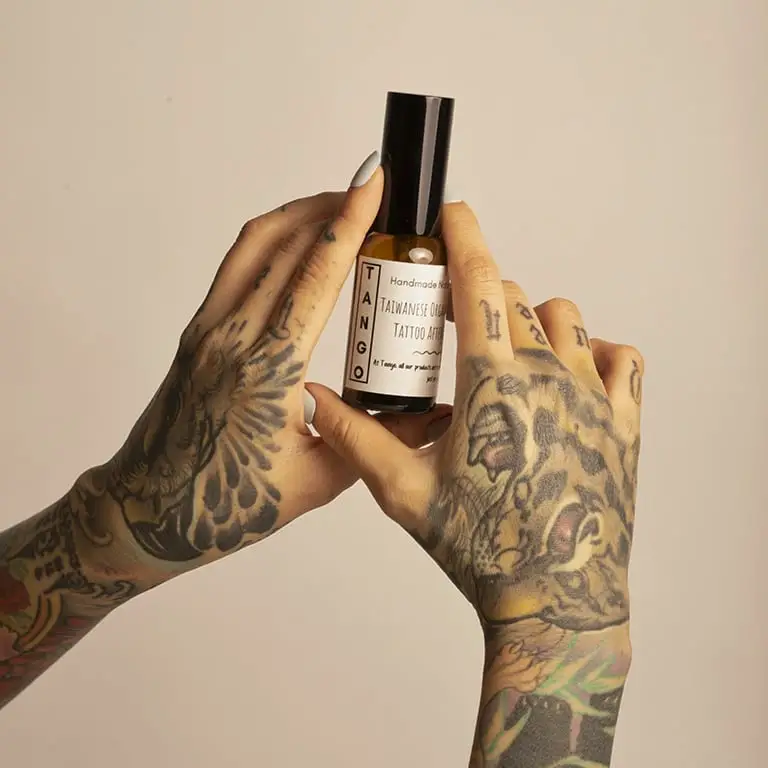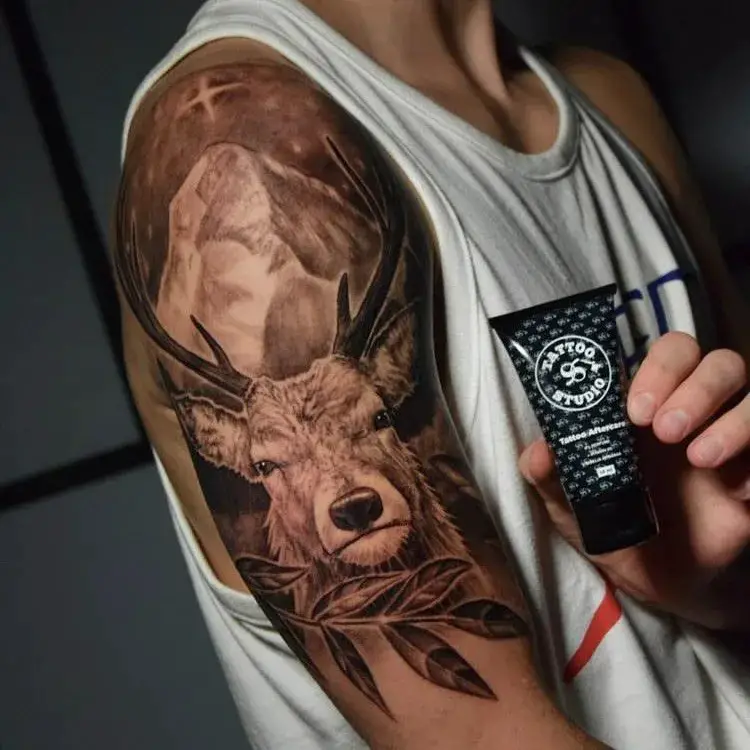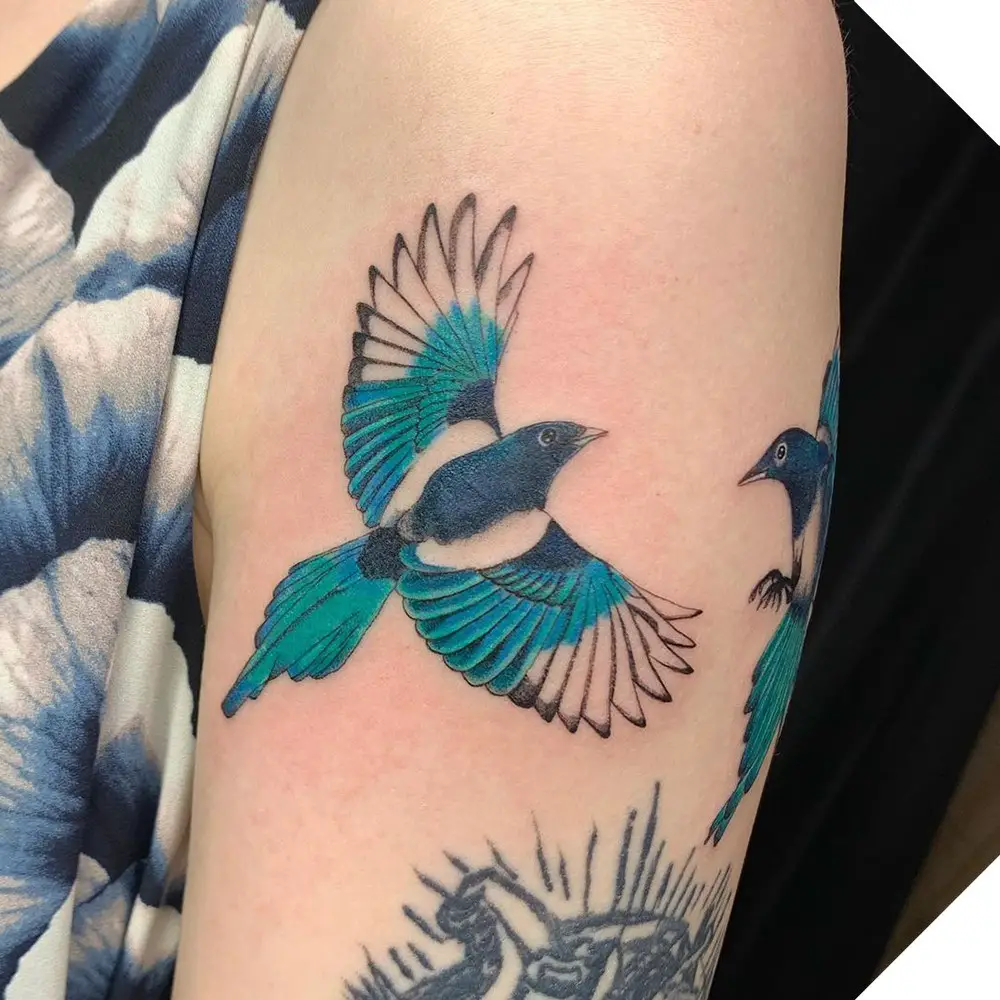Why You Should Use Coconut Oil for Tattoos (Plus Top 3 Products to Try)
[ad_1]
Congrats on your new ink! Now comes the aftercare routine. If you’re looking for a natural balm to soothe, hydrate and look after your new tattoo, coconut oil is probably on your radar.
This guide will take you through what coconut oil is, why we think it’s THE BEST for new tattoos, and what kind of coconut oil you should use. Coconut oil has some amazing properties that make it great for your fresh ink.
There are a million different tattoo balms out there to buy, so let our guide help you find the best one.
What is Coconut Oil?

Coconut oil is a natural, fatty oil harvested from coconuts. It’s a moisturizing, healing oil (rather than a drying one) when used for skincare, but it can also be used for numerous other things. Even cooking!
The attraction to coconut oil over other tattoo balms, is that it’s completely natural. Although there are several ways it can be pressed and processed (more on this below) it’s still a very pure and simple treatment to use on your tattooed skin.
Furthermore, coconut oil is affordable and can be used on all your skin – not just the inked areas.
5 Reasons to Use Coconut Oil on Your Tattoo

Coconut oil has some unique properties that make it a better moisturizer for tattoos compared to alternatives (like shea, for example).
Moisturizing – coconut oil locks in moisture and softens your skin. It will keep that hydrating tattoo goo locked into your skin, prevent it from cracking and drying out. Furthermore, coconut oil softens your skin and any scabs that have formed, so they won’t be so painful or itchy as they naturally soften and flake off.
Antiseptic – coconut oil has antibacterial properties, so it can prevent bacteria from growing on your tatt and causing an infection. Furthermore, coconut oil has some anti-inflammatory properties, so it will reduce redness and swelling, which are common when you have a fresh tatt.
Promotes Healing – there are very few vitamins found in coconut oil, but the two that are present are vitamin K and vitamin E. Vitamin K can help promote blood clotting, so your skin will scab over and heal faster, while vitamin E is known to reduce UV damage to your skin from the sun.
Great Shine – coconut oil provides a lovely shine when it’s applied to your skin, which can make your tattoo pop. As the fatty oil locks in hydration, it also creates a protective barrier on your skin. The result is a subtle shine and soft skin.
Vibrant Ink – coconut oil hydrates, strengthens and rejuvenates your skin, which is great for both old and new tattoos. If your old tattoo has lost its vibrancy, or your skin is dry and lackluster, applying coconut oil regularly can help to restore it.
These properties of coconut oil make it a brilliant product for your skin, whether you have a new tattoo or an old one. Allergic reactions to coconut oil are rare, but make sure you follow our test patch instructions below, just in case!
How to Use Coconut Oil for Tattoo Aftercare

The first thing you should do is follow the advice of your tattoo artist. They will tell you how to clean the area, what moisturizer to use, and what timeline to follow. When you reach the stage where you can begin to moisturize your new tattoo, you can also use coconut oil to lock that moisture in.
Step 1 – Buy New Coconut Oil
The best coconut oil for your tattoo is virgin coconut oil – we’ll explain why in more detail a bit later.
But regardless of whether you already have virgin coconut oil, you should buy a new pot or tube. Keep this new pot separate and only use it for your tattoo. Don’t forget to always clean your hands and tattoo before you touch the coconut oil and apply it.
This ensures that there’s no bacteria or contamination that could cause an infection. If your tattoo is new and still healing, this is incredibly important!
Step 2 – Test Patch
Virgin coconut oil is solid at room temperature, so you will need to melt it. If you have a small tattoo you can melt enough by just rubbing a little oil between your hands. If you have a large tattoo, you can use the microwave to melt a larger amount.
If you do use the microwave, make sure the oil is lukewarm before you apply it.
Apply a very small amount of coconut oil to a patch of skin that is not tattooed. Forearms are usually the best area, but if this is where your ink is choose another sensitive place. The top of your foot, for example, is a good placement.
Once applied, cover the area with a band-aid or bandage and wait at least 2 days. If no reaction occurs then you’re safe to use the coconut oil for tattoo aftercare.
Step 3 – Apply a Thin Layer
Remember, coconut oil doesn’t provide much moisture. Instead, it locks moisture in and protects your skin. Apply a moisturizer that’s recommended by your tattooist as regularly as they suggest.
Once that moisturizer has seeped completely into your skin, apply a thin layer of coconut oil on top. Scoop a little out with one fingertip – this should be enough oil for a small-medium tattoo. It’s better to apply small, thin layers and build them up if you need to!
When you’ve got the right amount of coconut oil on, your skin should feel smooth and shiny. If it feels sticky or there’s residue, keep spreading the coconut oil over your skin for a thinner layer.
Step 4 – Reapply When Needed
Whether your tattoo is a new one or an old one, you will be washing the area regularly. Washing your skin with soap and warm/hot water draws out much of the moisture, so it’s a good idea to rehydrate your skin and apply coconut oil afterward.
Regularly applying a thin layer of coconut oil over your tattoo will keep the skin supple, strong and your ink vibrant.
Although coconut oil does provide some UV protection, applying sunscreen will still be necessary if you live in a sunny area and your tattoo is in an exposed placement. The sun can significantly fade tattoos and speed up the aging process of your skin if you don’t cover up and apply protection.
Also Read:
- Can You Use Baby Lotion On a New Tattoo?
- 8 Best Tattoo Aftercare Products Based On Experience (2021)
- Tattoo Aftercare: Everything You Need to Know (2021 Updated)
Potential Side Effects of Using Coconut Oil

Allergic reactions to coconut oil are unlikely, but they do happen. That’s why running a test patch is important.
After you’ve applied the test patch, watch out for any redness, itchiness, hives, or signs of an allergic reaction. If these symptoms pop up, immediately wash the area gently. You should also contact a medical health professional or your doctor if the symptoms are severe or they persist.
Coconut oil can also cause acne for some people. While it’s not a severe allergic reaction, it does mean that you cannot use the coconut oil on your tattoo. Your fresh ink and healing skin will be very sensitive, so if you have any bad reaction to the oil (even if it’s very minor) it will feel 10x worse when it’s applied on the ink.
If you have any doubts about using coconut oil for tattoos, there are two people you should talk to first:
- Your tattoo artist – they will give the best advice on when to apply the coconut oil. They may advise you wait several weeks before applying it for the first time. They may be able to recommend a good virgin coconut oil brand, or even sell you a tub from their tattoo parlor.
- Your doctor or dermatologist – if coconut oil irritates your skin, they can give you alternatives. Shea butter is a popular one to try. They can also provide relief if your coconut oil test patch caused a bad reaction.
The Best Kind of Coconut Oil for Tattoos

Not all coconut oils are created equal. There are numerous ways of processing and pressing coconut oil to create the final product.
Virgin, refined, and cold-pressed coconut oil is the best for your tattoo. The processing to make this type of oil leaves very few impurities and irritants in the oil that can upset your skin.
The other type of coconut oil that’s good for your tattoo, is specially formulated moisturizers. These are more suitable for old tattoos, as they contain other ingredients to moisturize and nourish your skin.
For new tattoos, however, you’ll want to stick with a pure virgin coconut oil.
1. Coco & Co – The Purest Virgin Coconut Oil
- Type: Pure coconut oil
- Volume: 236ml
- Price Range: $$
If you want a plain coconut oil to use for your healing tattoo, we recommend this one. It’s a little pricier than the coconut oil you use for cooking because it’s processed to a beauty grade. That means it has no odor, no colorings or other impurities added that will irritate your skin. It’s a perfect, basic coconut oil moisturizer to help soothe your new tattoos.
It’s vegan, organic, and free of parabens, gluten, sulfates, and chemical preservatives. We love that it’s made from Fairtrade-certified coconuts too. It’s good for your skin and the planet.
2. Ojio Organic Coconut Oil
- Type: Pure coconut oil
- Volume: 470ml
- Price Range: $
This is an organic, extra virgin, unrefined and cold-pressed coconut oil. But unlike the previous one, it’s not beauty-standard. That’s how they can provide twice as much coconut oil for pretty much the same price.
Nonetheless, this is a good coconut oil that is pure and well-filtered. It’s suitable for cooking and can be used on your skin too. We wouldn’t advise using it for both, and we also wouldn’t advise using it on very new tattoos.
Instead, it’s a good option if you need a cheap daily moisturizer to keep your old ink feeling fresh.
3. Stories & Ink Daily Moisturizer for Healed Skin
- Type: Moisturizing formula
- Volume: 200ml
- Price Range: $$$
This is a daily moisturizer that’s designed to keep healed ink bright and your skin soft. It contains a range of ingredients including coconut oil, so it’s not suitable for very new ink and still-healing tattoos.
The active ingredients firm and smooth your skin, which keeps your tattoo bright – just like when it was freshly inked. It also contains inca inchi oil to improve skin elasticity and vitamin E acetate to increase moisture at the surface of your skin. And don’t forget, the coconut oil ingredient locks all the goodness in.
This daily moisturizer is cruelty-free, vegan, paraben-free and provides UVA and UVB protection.
Quick FAQs
Too pressed for time to read our full article? Maybe you’ll find the answers to your questions here.
Is it safe to use coconut oil on tattoos?
Yes, it is safe to use coconut oil on old and new tattoos – so long as you do a test patch beforehand, to check for allergic reactions.
What coconut oil should I use on my tattoo?
For new tattoos, it’s important to use uncontaminated, virgin cold-pressed coconut oil that won’t irritate your skin further.
What are the side effects of using coconut oil on my skin?
Potential side effects include itching, a rash, hives, and inflammation – all the typical signs of an allergic reaction. If you experience any of these side effects during the test patch, wash off the coconut oil and whatever you do, don’t put on your tattoo!
What is the best alternative to coconut oil for tattoos?
Shea butter is a very good alternative, as it is soothing on your sensitive, newly tattooed skin. Talk to a dermatologist if you need to find another option.
The post Why You Should Use Coconut Oil for Tattoos (Plus Top 3 Products to Try) appeared first on Saved Tattoo.
[ad_2]
